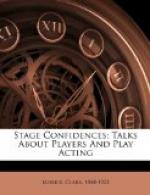A certain English actor, who had been with him two or three seasons, made a curious little mistake night after night, season after season, and no one seemed to heed it. Of course Salvini, not speaking English, could not be expected to detect the error. Where the venomous priest should humbly bow himself out with the veiled threat, “This may yet end in a trial—and—conviction!” the actor invariably said, “This may yet end in a trial of convictions!” Barely three nights had passed when Signor Salvini said to his son, “Why does Miss Morris smile at that man’s exit? It is not funny. Ask why she smiles.” And he was greatly put out with his actor when he learned the cause of my amusement. A very observant man, you see.
He is a thinking actor; he knows why he does a thing, and he used to be very intolerant of some of the old-school “tricks of the trade.” Mind, when I was acting with him, he had come to understand fairly well the English of our ordinary, everyday vocabulary, and if he was quite calm and not on exhibition in any way, he could speak it a little and quite to the point, as you will see. He particularly disliked the old, old trick called “taking the stage,” that is, when a good speech has been made, the actor at its end crosses the stage, changing his position for no reason on earth save to add to his own importance. It seemed Salvini had tried through his stage manager to break up the wretched habit; but one morning he saw an actor end his speech at the centre of the stage, and march in front of every one to the extreme right-hand corner. A curl came to the great actor’s lip, then he said inquiringly, “What for?” The actor stammered, “I—I—it’s my cross, you know—the end of my speech.”—“Y-e-es,” sweetly acquiesced the star. “Y-e-es, you cross, I see—but what for?” The actor hesitated. “You do so,” went on Salvini, giving a merciless imitation of the swelling chest and stage stride of the guilty one, as he had crossed from centre down to extreme right. “You do so—but for why? A-a-ah!” Suddenly he seemed to catch an idea. “A-a-ah! is it that you have zee business with zee people in zee box? A-a-ah! you come spik to zose people? No? Not for that you come? You have no reason for come here, you say? Then, for God’s sake, stay centre till you have a reason!”
It was an awful lesson, but what delicious acting. The simple, earnest inquiry, the delighted catching at an idea, the following disappointment, and the final outburst of indignant authority—he never did anything better for the public.
During the short time we acted together but one cloud, a tiny, tiny one of misunderstanding, rose between us, but according to reports made by lookers-on a good deal of lightning came out of it. Of course not understanding each other’s language, we had each to watch the other as a cat would watch a mouse, in order to take our cues correctly. At one point I took for mine his sudden pause in a rapidly




